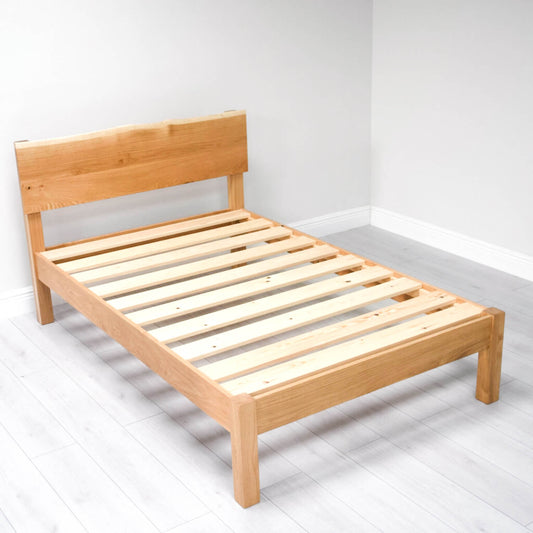Here at The Wooden Bed Company, we truly appreciate the importance of a good night’s sleep. Such a slumber can really help to lift the mood, giving you plenty of energy for the day ahead. Deep sleep can also make a big difference to your body, with benefits such as muscle recovery and enhanced brain function. But what exactly is deep sleep? And how much of it do you need? Read on for the answers to these essential questions.
What is Deep Sleep?
Deep sleep is one of the four stages of the sleep cycle. You’ll move through these stages between four and five times during the average night, with deep sleep allowing for the greatest mental and physical recovery. Falling under the category of non-rapid eye movement sleep, this stage involves a slowing of the brain waves, pulse, and breathing rate.
What are the Stages of Deep Sleep?
After drifting off and going through the initial phases of light sleep, you’ll naturally fall into a more relaxed and restorative slumber. This will be followed by a period of REM sleep, where your brain becomes more alert and you may experience vivid dreams. The entire sleep cycle takes between 90 and 120 minutes, with repeat stages of deep sleep so that you wake up feeling fully refreshed.
Why is Deep Sleep So Important?
As mentioned, deep sleep is the most restorative stage of the sleep cycle. It involves the release of growth hormones, which help our bodies recover. Reduction of the body’s temperature, blood pressure, and heart rate means that vital energy is preserved for the following day, with deep sleep also enhancing memory consolidation.
Other benefits of deep sleep include:
- Muscle and tissue repair
- Strengthening of the immune system
- Maintaining hormonal balance
- Stabilising mood and reducing anxiety
Research has also shown the positive impacts of deep sleep in preventing chronic diabetes, heart disease, and dementia.
How Much Deep Sleep Do You Need?
While there’s some variation, the average person requires at least seven hours of sleep per night. Between 13% and 23% of this time should be spent in deep sleep, with one to two hours of such restorative sleep during a complete eight-hour cycle.
However, there’s no need to stress if your sleep is interrupted, as the body naturally regulates the amount of deep sleep that you get over time. The levels of deep sleep are also bound to reduce as you age, with more time spent in the lighter stages.
Too Much Deep Sleep vs Too Little Deep Sleep
You can have too much of a good thing, with an excessive amount of deep sleep likely to cause mental fog and difficulty staying awake during the day. This might be the result of disruptions of the circadian rhythm, depression, or a sleep condition such as hypersomnia.
You should aim to strike a balance, since too little deep sleep, on the other hand, could cause feelings of mental and physical fatigue. Not getting enough deep sleep will also leave you more vulnerable to infections, and potentially increase your cravings for fatty foods.
Other symptoms of insufficient deep sleep include:
- Lack of attention and focus
- Memory problems
- Persistent feelings of tiredness
Besides ageing, such issues might result from an underlying deep sleep disorder (such as sleep apnea or insomnia), poor sleep hygiene, or chronic illness. If you experience persistent and life-impacting lack of deep sleep, it’s worth booking an appointment with your GP.
How to Get More Deep Sleep
There are various ways you can fully realise the benefits of deep sleep. First up, keep to a consistent sleep schedule, going to bed and getting up at roughly the same time each day. It’s also a good idea to spend some time winding down, perhaps reading a book or listening to a soothing meditation, before drifting into a relaxing sleep.
You can also increase deep sleep by:
- Having a regular daytime exercise routine
- Avoiding caffeine after lunch and alcohol after dinner
- Maintaining a cool and peaceful sleep environment
- Cutting down the use of phones and other devices for at least 30 minutes before bed
You might find that it helps to take a soothing bath, raising the body temperature before it falls again in the transition to a rejuvenating sleep. Dietary changes might also make a difference, with a known link between high-fibre foods and quality sleep.
Enjoy Deep Sleep with The Wooden Bed Company
From muscle recovery to improved mood and increased energy, there’s no denying the benefits of deep sleep. And, since too much and too little can both potentially cause problems, you should make sure you get just the right amount.
That’s where the Wooden Bed Company comes in, with a selection of wooden beds handcrafted to help you drift into the most restorative sleep. Designed for ultimate comfort and the sweetest dreams, these beds are sure to pass the test of time. They can be combined with soft and soothing mattresses for the deepest sleep, too.















